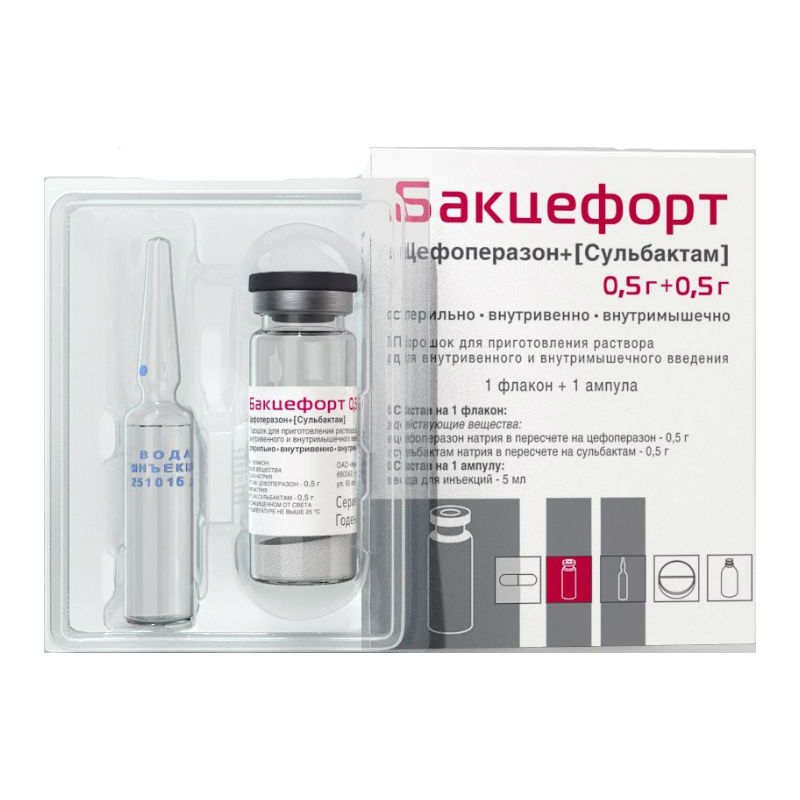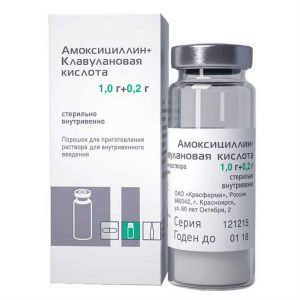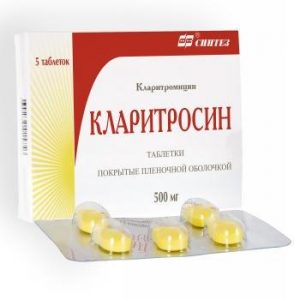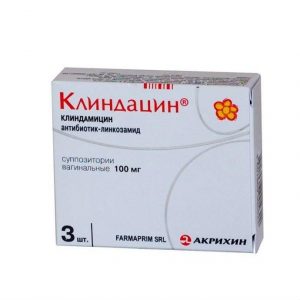Description
Pharmacological action
Combined drug, broad-spectrum antibiotic.
Cefoperazone is a third-generation cephalosporin antibiotic that acts bactericidal, has a wide spectrum of activity, is highly active against aerobic and anaerobic gram-positive and gram-negative microorganisms (including Pseudomonas aeruginosa), and is resistant to beta-lactamases of gram-positive and gram-negative organisms.
Sulbactam is an irreversible inhibitor of beta-lactamases, which are secreted by microorganisms, resistant to beta-lactam antibiotics prevents the destruction of penicillins and cephalosporins under the action of beta-lactamases of resistant microorganisms, binding to penicillin-binding proteins, shows synergism with simultaneous use with penicillins and cephalosporins.
The combination of cefoperazone + sulbactam is active against all microorganisms sensitive to cefoperazone and exhibits synergism (reduces up to 4 times the BMD combinations compared to the values ² ¹ ² ¹for each component separately) against microorganisms: Haemophilus influenzae, Bacteroides spp., Staphylococcus. Acinetobacter calcoaceticus, Enterobacter aerogenes, Escherichia coli, Proteus mirabilis, Klebsiella pneumoniae, Morganella morganii, Citrobacter freundii, Enterobacter cloacae, Citrobacter diversus.
Active in vitro against gram-positive bacteria – Staphylococcus aureus (including strains that form and do not form penicillinases), Staphylococcus epidermidis, Streptococcus pneumoniae, Streptococcus pyogenes (beta-hemolytic strain of group A), Streptococcus agameta agameta groups B), most strains of beta-hemolytic Streptococcus spp., Enterococcus faecalis of gram-negative bacteria – Escherichia coli, Klebsiella spp., Enterobacter spp., Citrobacter spp., Haemophilus influenzae, Proteus mirabilis, Morganella morganii, Providenciarattppi. spp. (including Serratia marcescens), Salmonella spp., Shigella spp., Pseudomonas aeruginosa, Acinetobacter calcoaceticus, Neisseria gonorrhoeae, Neisseria meningitidis Bordetella pertussis, Yersinia enterocolitica of anaerobic bacteria – Bacteroides fragilis, Fusobacterium spp., Peptococcus spp., Peptostreptococcus spp., Veillonella spp., Clostridium spp., Eubacter spp., Lactobacillus spp.
Indications
Treatment of infectious and inflammatory diseases caused by microorganisms sensitive to the combination of cefoperazone + sulbactam: pharyngitis, tonsillitis, sinusitis, bronchitis, pneumonia, bronchopneumonia, empyema, lung abscess, pyelonephritis, cystitis, prostatitis, gonitis, prostatitis, gonitis, prostatitis, enditis, cholecystitis, cholangitis acute otitis media, sinusitis, tonsillitis furunculosis, abscess, pyoderma, lymphadenitis, lymphangitis osteomyelitis, joint infections, sepsis, meningitis.
Prevention of infectious complications after abdominal, gynecological and orthopedic surgery, in cardiovascular surgery.
Contraindications
Hypersensitivity to cefoperazone, sulbactam, penicillins, and other cephalosporins.
Precautions: renal and / or liver failure, colitis (including a history), premature infants, pregnancy.
Special instructions
With the simultaneous use of aminoglycosides, renal function must be monitored.
In patients with liver disease and / or with obstruction of the biliary tract, T1 / 2 of cefoperazone increases, excretion by the kidneys is increased. In severe liver dysfunction, the concentration of cefoperazone in bile is therapeutic, T1 / 2 increases 2-4 times. Changing the dose and controlling the concentration of cefoperazone in the blood serum is required for severe obstruction of the biliary tract, severe liver failure (maximum daily dose is 2 g).
Vitamin K deficiency is at risk for patients on an inadequate diet or malabsorption (patients with cystic fibrosis who have been on parenteral nutrition for a long time). In such patients, prothrombin time should be monitored if necessary. Vitamin K. The mechanism of development of vitamin K deficiency is the suppression of intestinal microflora, which normally synthesizes this vitamin.
With prolonged treatment, it is necessary to monitor renal, hepatic, and hematopoietic function.
During the treatment period, false-positive results of determination of glucose in the urine when using Benedict or Feling solutions, a false-positive Coombs reaction can be observed.
Treatment of premature infants, pregnant women, during lactation is carried out if the possible benefit outweighs the potential risk.
Composition
Composition per 1 vial: Active ingredients: Cefoperazone sodium in terms of cefoperazone – 0.5 g, Sulbactam sodium in terms of sulbactam – 0.5 g
Dosage and administration
Intravenously or intravenously administered.
The ratio of the components of the combination is 1: 1.
For adults, the daily dose of the combination is 2-4 g (cefoperazone 1-2 g + sulbactam 1-2 g). The daily dose should be divided into equal parts and administered every 12 hours.
In severe or refractory infections, the daily dose of the combination can be increased to 8 g (cefoperazone 4 g + sulbactam 4 g).
For children, the daily dose of the combination is 40-80 mg / kg / day (cefoperazone 20-40 mg / kg + sulbactam 20-40 mg / kg). The daily dose should be divided into equal parts and administered every 6-12 hours.
In case of serious or refractory infections, the daily dose of the combination can be increased to 160 mg / kg.
In newborns, the combination should be administered every 12 hours during the first week of life. The maximum daily dose of sulbactam in children should not exceed 80 mg / kg / day.
In patients with severe renal impairment (CC 15-30 ml / min), the maximum dose of sulbactam is 1 g every 12 hours (maximum daily dose of sulbactam is 2 g), and in patients with CC less than 15 ml / min, the maximum dose of sulbactam is 500 mg every 12 hours (the maximum daily dose of sulbactam is 1 g). In severe infections, additional administration of cefoperazone may be required. Since the pharmacokinetics of sulbactam changes significantly during hemodialysis and T1 / 2cefoperazone from serum decreases slightly, the administration of this combination should be planned after dialysis.
If the serum concentration of cefoperazone is not regularly monitored, the minimum daily dose should not exceed 2 g.
If it is necessary to administer more than 80 mg / kg / day, calculated by the activity of cefoperazone, the dose increase is achieved due to the additional administration of cefoperazone.
For iv bolus administration, the contents of the vial are dissolved in an adequate volume of 5% dextrose solution, 0.9% sodium chloride solution, 5% dextrose solution in 0.225% sodium chloride solution, 5% dextrose solution in 0.9% sodium chloride solution or sterile water d / and, and administered for 3 minutes for iv infusion, dissolved as described above, diluted to 20-100 ml and injected for 15-60 minutes for iv administration, sterile water d / u is used for dissolution.
Preparation of a solution using lidocaine: dilution is carried out in 2 stages – with sterile water, then with 2% lidocaine solution to obtain a 0.5% lidocaine solution. The total solvent volume is 6.7 ml.
Side effects
Allergic reactions: anaphylactic shock.
From the digestive system: diarrhea, nausea, vomiting, pseudomembranous colitis, a transient increase in liver function indicators – AST, ALT, alkaline phosphatase, bilirubin in blood serum.
Allergic reactions: maculopapular rash, itching, urticaria, Stevens-Johnson syndrome (the risk of developing these reactions is higher in patients with a history of allergic reactions).
From the hematopoietic system: a decrease in the number of neutrophils, reversible neutropenia (with prolonged treatment), a decrease in hemoglobin and hematocrit, transient eosinophilia, leukopenia, thrombocytopenia, hypoprothrombinemia in some cases – a positive Coombs test. When using a solution of Benedict or Feling, a false-positive reaction to glucose in the urine can be observed.
From the urinary system: hematuria.
Local reactions: sometimes after a / m injection there is a transient pain, burning at the injection site. With the on / in the introduction using a catheter, phlebitis may develop at the site of infusion.
Other: headache, fever, chills, vasculitis.
Storage conditions
Store in a dry, dark place, out of the reach of children, at a temperature not exceeding 25 ° C.
Active ingredient
Cefoperazone, [Sulbactam]




